- Home
- Thomas DePrima
A Galaxy Unknown Page 3
A Galaxy Unknown Read online
Page 3
The final cull of cadets still in pursuit of a warship command is performed at the completion of their fourth year. Those who have exhibited a pronounced ability for such command, are ordered to report to the GSC Warship Command Institute following graduation from the Academy. Successful completion of the two-year intensive command training program will see them advanced to the rank of lieutenant(jg) and posted to the first available command slot on a warship. Those who wash out join the command personnel never offered the opportunity to attend the WCI, as ensigns assigned to quartermaster ships, troop transports, outpost barques, research craft, hydrogen harvesters and tankers, diplomatic corps yachts, or other non-combat vessels.
Jenetta's poor scores in command and control exercises meant her chances of getting into the WCI weren't nearly as good as the survival chances of the proverbial ‘snowball in hell.' She was likewise barred from bridge duty aboard the aforementioned support ships, or even a reclamation vessel, leading to the private joke among the more supercilious of her classmates that she, like all the others dropped from the command program prior to their fourth year, ‘wasn't even fit to haul garbage.'
The finding of the Academy's Evaluation Panel had been that Cadet Jenetta Alicia Carver was ideally suited to be a Science Officer. So it was that her fourth year at the Academy was dedicated to concentrated studies in the field of astrophysics. There she excelled. The lack of ambiguity in her mathematics and science coursework allowed her to enfold herself in her academy endeavors like never before. She even found sufficient time to devote to her other passion, computers.
* * *
Prior to graduation, the soon-to-be ensigns not continuing their studies elsewhere receive orders informing them of their postings. Jenetta hesitated briefly before touching the data ring containing her orders to the interface spindle of her computer console. She knew that her dream of a life in space was about to be crushed once and for all. Her final C&C ranking didn't entitle her to a posting aboard ship. Her best hope now was that she'd at least be posted off-world so she'd occasionally have a chance to travel in space as a passenger. Taking a deep breath, she nervously touched the data ring to the spindle and watched as the image of a Lt. Commander appeared on the screen. As she listened to the recording, her eyes grew wide and she screamed so loud and long that her classmates in the adjoining barracks rooms, believing that someone was being attacked, came running to her room!
Cadet Lieutenant Karen Anderson, her closest friend at the Academy, reached her first. Grabbing her, to quiet her down and stop her from jumping, Karen shouted, "What's happened?"
So loudly that students at the cadet mess a block away might have heard her, Jenetta screamed, "I've got a ship! I've got a ship! I'm going into space!"
"You got a ship?" Karen said incredulously as more girls gathered at the door. "That's impossible. Your command and control scores were about the lowest in the class; even worse than mine. You have to place in the top seventy-five percent of C&C to be considered even for a support staff posting aboard a ship."
Clutching the data ring containing her orders tightly in her hand and grinning like the Cheshire cat from Alice in Wonderland, Jenetta said more calmly, "Impossible or not, I've got orders to report to the Hokyuu. It's moored at Earth Station Three, and Ensign Jenetta Alicia Carver is to be the ship's new Science Officer."
Karen just shook her freckled-faced head in disbelief, her collar-length red hair swinging wildly. "You couldn't have gotten a ship. Somebody's made a mistake."
"I don't care if it is a mistake," Jenetta said lightly as she slid the burnished, white silver data ring onto the small finger of her right hand. It was a perfect fit, having been selected as the recording medium after checking her Academy file for her finger size. "I'm going to report to the ship as ordered. If they don't want me, they'll have to send me back. I'm certainly not going to question the assignment."
"It has to be because of your outstanding math and science grades," Maria Torres, a Castilian beauty with blacker than black shoulder-length hair, offered from the doorway. "You're what, the first cadet in seven years to receive the Admiral Matthew Tissdell Award for Excellence in Mathematics? That's what they look for in a shipboard Science Officer. I bet they pushed you up onto the eligibility list solely because of that. After all, it's not as if a science officer is ever going to be in a position of command while any other officer still lives."
Jenetta, nimbly dancing and pirouetting around the room, replied giddily, "I don't care why. I'll be anything, and I'll do anything. All that's important right now is that I'm going into space. It's all I've dreamed of since I was a little girl, and now I'm going."
"Don't get too excited," Heather Gulvil said casually. "A close friend of my father was posted on the Hokyuu. That old bucket is just a quartermaster's supply ship, and all you'll be doing is ferrying food and supplies to off-world bases that no one ever heard of. If you're lucky, you'll get liberty in some real port every couple of years."
As Jenetta began pulling Karen around by her hands, trying to get her to join in her celebration, she said lightly, "I still don't care. I'm going into space and that's all that matters. In a few years I might wangle an SO assignment on a research ship, or maybe even a destroyer."
"Destroyer, hah! Good luck," Heather said derisively. "They want officers who don't have to think for five minutes before making a decision. You might make it aboard a research vessel, though. You'll fit right in with the other eggheads."
Jenetta stopped dancing and fixed an intense stare upon the five-foot seven-inch brunette. "Really? And where are you being posted, Heather?"
"I have orders to report to the destroyer Vancouver at Earth Station One," she replied haughtily.
"That's only her ride," Maria Torres said, her dark-chocolate eyes twinkling and her smile gleaming brightly. "She's being posted to the Ethridge Space Command Station at Nivella-3 as a Junior Food Service Administrative Officer." A little more cattily, she added, "Maybe you'll be supplying food to her off-world base that no one ever heard of."
Karen started laughing hysterically as Heather glowered, turned, and walked sullenly back to her room without saying anything further. The rest of the girls grinned before returning to their rooms, while the freckle-faced redhead finally gave in, smiled widely, and began blithely dancing around the room with Jenetta.
* * *
Newly commissioned Ensign Jenetta Carver eagerly reported to the Hokyuu at Earth Station 3 a few weeks later. Merely a supply ship, the Hokyuu's crew complement was small when compared to that of a warship, and Jenetta was to be the only Science Officer on board, but that didn't diminish her excitement at going into space. She spent the better part of fifteen minutes just staring at the gargantuan, six-point-three million-ton cargo vessel through a viewing port near the airlock before finally proceeding out the airlock pier.
The quartermaster ship didn't have a Marine complement, and there were no sentries in evidence at the entrance to the ship; just one bored looking lieutenant(jg). Having the dubious distinction of being the officer of the deck at the forward cargo bay airlock, he accepted her data ring and touched it to his viewpad's spindle interface to confirm that the bright-eyed young officer was really assigned to the ship. When her image was returned from the ship's computer as confirmation of her posting, he handed back the ring and allowed her entry, telling her to wait just inside the airlock hatchway for an escort.
The ship's fourth officer, Lieutenant Randal Coster, came to the bay when notified of her arrival and escorted Jenetta first to her quarters, then to the astrophysics lab. Coster, an eighteen-year Space Command veteran and self-important minor cog in the Hokyuu's chain of command, towered over Jenetta with his six-foot six-inch height. The gold, inverted ‘V' insignia of a command officer gleamed brightly on his collar.
"Here you go, Ensign," Coster said. "This is your lab." Glancing scornfully down at the science officer insignia on Jenetta's collar, a wide gold ring with two short gold bars that bisect
ed the ring on opposite sides, he said, "You'll spend each first watch here, performing whatever it is you people do. Should the computer detect anything abnormal while you're off-duty, you'll immediately report here and determine the nature of the problem. Any questions?"
"Uh, just one, sir. What's our destination?"
Coster had little personal use for science-types, especially recently graduated ensigns who, in his words, ‘would probably sit and enjoy the spectacle of a super nova instead of getting the hell away as fast as possible', and he didn't try to conceal his feelings. His jealousy of people who could master the finer points of quantum physics and spatiotemporal trigonometry was the root cause of his often-derisive comments about science officers. His moderately respectable scores in the command and control lab exercises had allowed him to make the cut for shipboard duty, although his grades and aptitude hadn't been deemed adequate for him to attend the Warship Command Institute.
An officer bypassed during the WCI selection process, who later distinguishes himself or herself in action against an enemy, can receive a special appointment to the College, but being posted to a quartermaster ship left Coster with little such opportunity. The prospect of serving an entire, potentially mediocre, career making ‘milk runs' aboard a supply ship while fellow students enjoyed the prestige of serving aboard an active duty ship of the line certainly hadn't improved his temperament.
"It's all in your computer, Ensign," he said in an aggravated tone. "You do know how to use a computer, don't you, science officer?"
"Yes sir," Jenetta said, her calm voice not revealing a hint of the growing exasperation that she was feeling for the string of condescending remarks he had leveled since meeting her at the cargo bay. "I know how to use a computer." She was still too excited to let a disgruntled space weenie like Coster, bring down her mood.
"Then carry on, Ensign." Without another word, he turned on his heel and left the lab, overjoyed to have successfully completed the tedious duty of orientation for a new officer.
Jenetta rolled her eyes once and then set about exploring the huge lab, activating the equipment as she went. Some of it was older than the equipment she had trained on at the Academy, and all of it had seen a great many more years than she had. Although the equipment was outdated before she was born, the lab contained everything she required for her job. And it was all hers.
* * *
Three months after departure, as the tedium of long distance travel between inhabited solar systems and military bases began to catch up with her, Jenetta's enthusiasm had waned somewhat. At the start of each workday, she would sit at the science console and progress through all the motions of astral observation that had been performed tens of thousands of times before in the areas of space through which they would pass. Already containing every last bit of information that she could possibly record, the computer irritatingly verified back to her that she had both done the calculations correctly, and that there were no changes from previously reported observations. By exhibiting an interface demeanor even more exasperating than that of Lt. Coster, the shipboard computer system proved that it was seriously in need of reprogramming, and it took all of Jenetta's willpower to resist an unauthorized hack into the system with the specific goal of performing an ‘attitude adjustment.' She thought wryly, with a hint of a smile, that if she were able to hack into Coster's brain, and give him a new personality, she wouldn't hesitate for an instant.
Although able to complete her entire daily work assignment during the first hour of her watch, Jenetta was required to remain alone in the astrophysics lab until first watch ended. To kill time, she found herself spending long hours playing the ancient video game on her personal log ring. To remain politically correct, she told herself that the game kept her hand/eye coordination sharp as she destroyed attacking alien fighter craft by the thousands. When that grew tiresome, she recorded messages to home, or exercised. Jenetta was lithesome, and every ounce of her hundred eight pounds was properly placed and muscle solid. Like all Space Command officers, exercise was an integral part of her daily existence, and it kept her body fit and supple. The last hour of her shift was always devoted to jogging around the large deserted lab.
On her last evening aboard ship, Jenetta returned to her quarters feeling genuinely depressed. Glancing into the mirror, after slipping into her nightgown and brushing out her collar-length blond hair, she was dismayed to see the bored expression so plainly visible on her normally cheerful face.
A black-anodized aluminum picture frame containing an animated image of her family always occupied a prominent position on her dresser, and she wondered what her father and brothers were doing as she looked down at the 20x30 centimeter portrait. The other Carver children had all gone on to attend the Warship Command Institute and then been posted to the bridge of a Space Command warship. They were probably, at that moment, chasing smugglers or enjoying R&R privileges on some exotic alien world.
"Why can't something exciting happen to break this monotony?" she recorded on her personal log ring just before climbing into bed.
* * *
Chapter Three
The existence of hyperspace had been hypothesized since the twentieth century. Certain scientists and mathematicians claimed to be able to prove ‘mathematically' that it existed, but discovering a means of transitioning matter into or out of hyperspace continued to evade researchers. Once generally propagandized as the only practical avenue to faster than light travel, research all but ceased in that regard when a small cadre of scientists, working under a government research grant at a U.S. university, chanced upon a naturally occurring phenomena that they immediately named Dis-Associative Temporal Field Anomalies. Their original objective of finding new methods to more accurately predict the formation of tornados using lidar measurement was quickly set aside as excitement over the new phenomena gripped the team. DATFA research was later credited with pounding the final nail into the hyperspace FTL coffin.
Rather than simply being a different dimension in space, DATFAs exist outside space. Or at least outside the currently accepted physical laws and scientific definitions for three-dimensional normal-space and hyperspace, not the standard plebeian dictionary definition of ‘the unlimited expanse in which everything is located.' As word of the discovery leaked, scientists who had long theorized the existence of wormholes, though none had yet been identified, immediately announced that wormholes were simply naturally occurring DATFA interchanges with certain unique properties of stability and ingress. More pragmatic scientists preferred to engage in research with a proven scientific fundament, so the number of scientists working to develop the field of DATFA expanded rapidly. Within a decade, under the tight security of the U.S. military, the theorems had been developed into practical mechanics and the door to galactic adventure was about to be flung wide open. Miniscule formations of DATFA could be coalesced, then expanded to completely surround a physical entity. By ‘constructing' this temporal field anomaly around its entire length and breath, an entity effectively disassociates itself from the physical bonds of normal space and time. When viewed against development of life on Earth, the current inhabitants of the planet moved from an intrastellar civilization to interstellar explorers overnight.
A ship outfitted with a temporal field generator can first build its envelope, then advance by building another envelope, slightly ahead of, but overlapping, the first. The ship is then ‘absorbed' into the new envelope as the older envelope dissolves. In this way, the ship goes along for the ride like a surfer catching a wave, but being disassociated from the mechanics of the surrounding space and time means that there's no sensation of movement. To change direction, the shape of the next envelope is altered slightly with the forefront aimed more in line with the direction the ship wishes to travel. To speed up or slow down, the ship simply alters the rate at which new envelopes are created. When the temporal field generator is disengaged and the envelope dissolves, the ship is in a new place, still just as stationary as it
had been when the initial envelope was built. Time does not slow down as the ship approaches and then exceeds the speed of light. It's as if no such relative barrier exists in normal space. Nor does time stop for the travelers in the envelope. It simply continues as it had before. Inside the envelope a new space and time exists. A trip takes only as long as it takes to create the full series of temporal envelopes from starting point to destination.
By disassociating a spacecraft from space and time, Einstein's Theory of Special Relativity was marginalized for space travelers. In fairness to an incredibly brilliant mind, he had himself already admitted that something was missing from his calculations that prevented him from developing a single, unified theory of relativity. His theories about a repulsive form of gravity that emanates from empty space, and which was later named dark energy, would have benefited greatly from knowledge of temporal anomalies.
Earth's first successful Faster Than Light spaceship put the United States at the forefront of galactic exploration, and it continued to press that advantage by producing a series of ever faster spaceships, capable of generating new envelopes at ever greater speeds, as it explored the cosmos. Along the way, it naturally laid claim to planets capable of supporting human life, and immediately established colonies as evidence of that ownership. While international treaties governing ownership rights on Earth's moon had been signed, none that referred to territories outside Earth's gravitational influence had been officially inked. For decades, the issue was cause for great debate, anger, and hostility among the more fanatical elements in the nations on Earth technologically unable to send their own explorers into space, because it allegedly denied them the opportunity to spread their religions and cultures among the stars. Naturally, the ‘godless' United States was blamed by them as the party most responsible for their almost total inability to compete in space exploration. One senator, with tongue firmly planted in cheek while on the floor of the U.S. Senate, agreed to accept personal responsibility for the fact that camel dung cannot properly be synthesized into spacecraft fuel. He added that it's difficult to conquer the stars while you're doing your damndest to remain rooted in the eighth century.

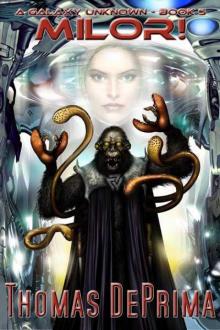 Milor!
Milor! New Title 1
New Title 1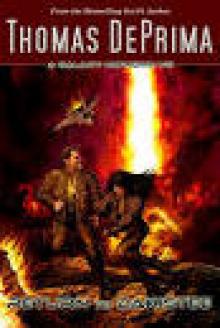 Return to Dakistee (A Galaxy Unknown, Book 8)
Return to Dakistee (A Galaxy Unknown, Book 8)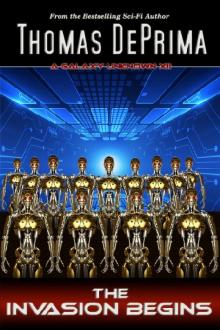 The Invasion Begins
The Invasion Begins When the Spirit Calls (When the Spirit... series - Book 2)
When the Spirit Calls (When the Spirit... series - Book 2)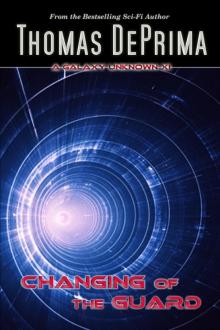 Changing of the Guard (A Galaxy Unknown - Book 11)
Changing of the Guard (A Galaxy Unknown - Book 11) When The Spirit Moves You
When The Spirit Moves You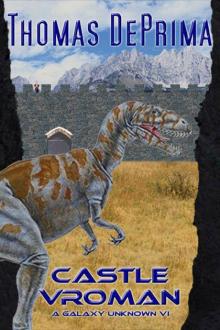 Castle Vroman
Castle Vroman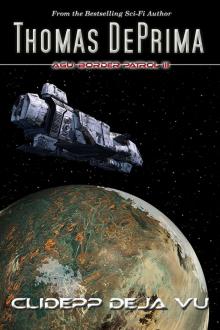 Clidepp Deja Vu
Clidepp Deja Vu Vengeance Is Personal (A Colton James Novel, Book 2)
Vengeance Is Personal (A Colton James Novel, Book 2)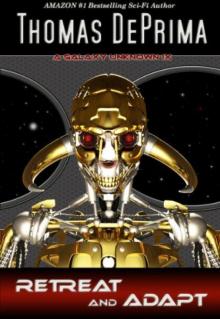 Retreat and Adapt
Retreat and Adapt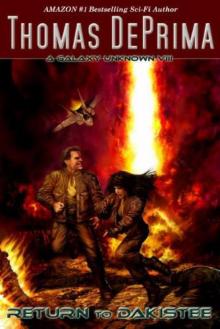 Return to Dakistee
Return to Dakistee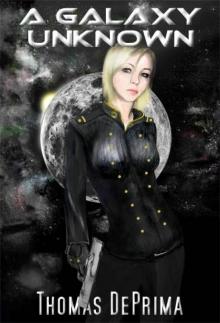 A Galaxy Unknown
A Galaxy Unknown